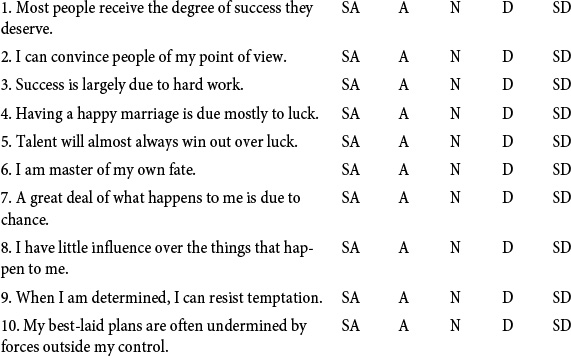
For each of the following ten statements, circle the response you find most appropriate from:1
SA = Strongly Agree
A = Agree
N = Neither Agree Nor Disagree
D = Disagree
SD = Strongly Disagree

For questions 1, 2, 3, 5, 6, and 9, give yourself 5 points for every Strongly Agree, 4 points for Agree, 3 points for Neither, and so forth. For questions 4, 7, 8, and 10, reverse your scoring—giving yourself 1 point for Strongly Agree, 2 points for Agree, and so forth.
Your score will range between 10 and 50. You can interpret your score approximately as follows:
42–50 = High internal locus of control
34–41 = Moderate internal locus of control
26–33 = Mixed
18–25 = Moderate external locus of control
10–17 = High external locus of control
Some people believe that they’re masters of their own fate. Other people see themselves as pawns of fate, believing that what happens to them in their lives is due to luck or chance. The first type—who believe that they control their destinies—have an internal locus of control. The latter type—who see their lives as being controlled by outside forces—have an external locus of control.2
Your locus of control score can provide you with insights into how well you accept blame for your actions. It can also suggest the degree of importance you place on improving your decision-making skills. People with a high external locus of control, for instance, tend to see themselves as relatively powerless in influencing their life. As such, they’re less concerned with developing strong decision-making skills because they don’t believe that their choices have much effect on their life outcomes. In contrast, high internals tend to be proactive. They sincerely believe that they can control their destiny. Because they believe that the choices they make really matter, they tend to be more highly motivated to learn better decision-making techniques.
People with very high internal scores may be guilty of believing the world is more controllable than it really is. People with very high external scores may be too quick to assume that they are merely a pawn in life’s game. Neither of these extreme positions is healthy. We can control a good part of our life, but there will always be surprises that no amount of planning or good judgment could anticipate. For high externals, my message is to realize that you have options, that your decisions do make a difference, and that learning good decision-making skills can put you more in control of your life.